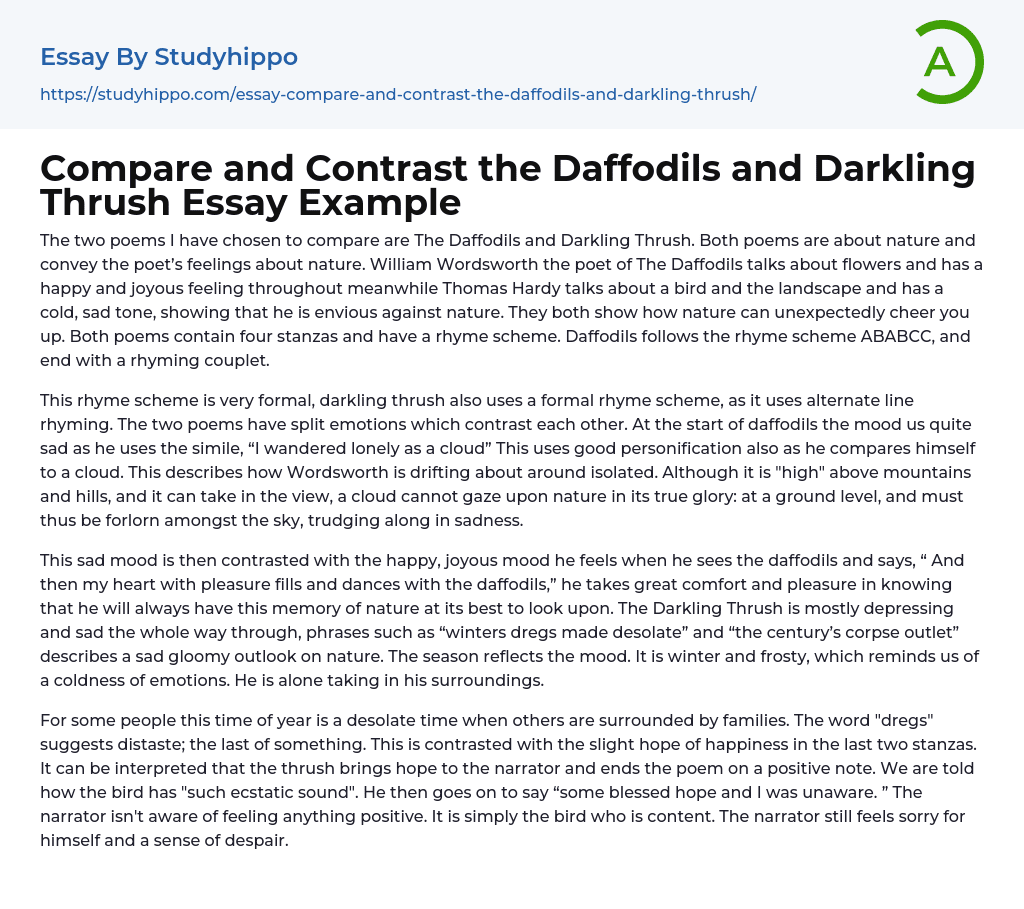

Compare and Contrast the Daffodils and Darkling Thrush Essay Example
The two poems I have chosen to compare are The Daffodils and Darkling Thrush. Both poems are about nature and convey the poet’s feelings about nature. William Wordsworth the poet of The Daffodils talks about flowers and has a happy and joyous feeling throughout meanwhile Thomas Hardy talks about a bird and the landscape and has a cold, sad tone, showing that he is envious against nature. They both show how nature can unexpectedly cheer you up. Both poems contain four stanzas and have a rhyme scheme. Daffodils follows the rhyme scheme ABABCC, and end with a rhyming couplet.
This rhyme scheme is very formal, darkling thrush also uses a formal rhyme scheme, as it uses alternate line rhyming. The two poems have split emotions which contrast each other. At the start of daffodils
...the mood us quite sad as he uses the simile, “I wandered lonely as a cloud” This uses good personification also as he compares himself to a cloud. This describes how Wordsworth is drifting about around isolated. Although it is "high" above mountains and hills, and it can take in the view, a cloud cannot gaze upon nature in its true glory: at a ground level, and must thus be forlorn amongst the sky, trudging along in sadness.
This sad mood is then contrasted with the happy, joyous mood he feels when he sees the daffodils and says, “ And then my heart with pleasure fills and dances with the daffodils,” he takes great comfort and pleasure in knowing that he will always have this memory of nature at its best to look upon. The Darkling Thrush is mostly depressing and sad the
whole way through, phrases such as “winters dregs made desolate” and “the century’s corpse outlet” describes a sad gloomy outlook on nature. The season reflects the mood. It is winter and frosty, which reminds us of a coldness of emotions. He is alone taking in his surroundings.
For some people this time of year is a desolate time when others are surrounded by families. The word "dregs" suggests distaste; the last of something. This is contrasted with the slight hope of happiness in the last two stanzas. It can be interpreted that the thrush brings hope to the narrator and ends the poem on a positive note. We are told how the bird has "such ecstatic sound". He then goes on to say “some blessed hope and I was unaware. ” The narrator isn't aware of feeling anything positive. It is simply the bird who is content. The narrator still feels sorry for himself and a sense of despair.
- Boo Radley essays
- Genesis essays
- Richard iii essays
- Alice in Wonderland essays
- On the road essays
- Ozymandias essays
- The Nightingale essays
- Holden Caulfield essays
- Animal Farm essays
- 1984 essays
- A Hanging essays
- Shooting An Elephant essays
- A Tale Of Two Cities essays
- Adventures Of Huckleberry Finn essays
- Arthur Conan Doyle essays
- Brave New World essays
- Characters In Hamlet essays
- Characters In Romeo And Juliet essays
- Desdemona essays
- Diary Of A Wimpy Kid essays
- First-Person Narrative essays
- Frankenstein essays
- Heart Of Darkness essays
- Jane Eyre essays
- Jay Gatsby essays
- King Duncan essays
- Librarian essays
- Little Red Riding Hood essays
- Lord Of The Flies essays
- Silas Marner essays
- The Cask Of Amontillado essays
- The Catcher In The Rye essays
- The Crucible essays
- The Handmaid's Tale essays
- The Reader essays
- Virgil essays
- Wuthering Heights essays
- Candide essays
- Castle essays
- J. D. Salinger essays
- Ulysses essays
- Ethan Frome essays
- In Cold Blood essays
- Outliers essays
- Tuesdays With Morrie essays
- The Art of War essays
- Wife of Bath essays
- Huckleberry Finn essays
- The Lady With The Dog essays
- Great Expectations essays



